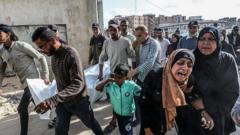The U.S. State Department is set to designate over half a dozen criminal organizations from Latin America as foreign terrorist organizations, following a recent executive order by President Trump aimed at eradicating these groups. This designation emerges from the administration's assessment that these cartels pose a significant national security threat that extends beyond traditional organized crime. According to anonymous sources familiar with the situation, the list of eight groups to be officially designated may shift prior to the public announcement.
State Department’s Plan to Designate Latin American Cartels as Terrorist Organizations

State Department’s Plan to Designate Latin American Cartels as Terrorist Organizations
The Trump administration prepares to label several Latin American criminal organizations as foreign terrorist groups, intensifying its approach to combating drug cartels.
The executive order mandates Secretary of State Marco Rubio to finalize the designations within a tight timeframe, as it seeks to impose severe economic sanctions on the identified organizations. The order specifically references major drug cartels operating in Mexico while also naming the Tren de Aragua from Venezuela and MS-13, a gang with roots in Salvadoran immigration to the U.S.
In addition to Tren de Aragua and MS-13, the designation will likely include the Colombian Clan del Golfo and multiple Mexican cartels, namely the Sinaloa cartel, the Jalisco New Generation cartel, the Northeast cartel, the Michoacán family, and the United cartels. These moves signify a more aggressive stance by the U.S. government against transnational organized crime involving drug trafficking and associated violence.
In addition to Tren de Aragua and MS-13, the designation will likely include the Colombian Clan del Golfo and multiple Mexican cartels, namely the Sinaloa cartel, the Jalisco New Generation cartel, the Northeast cartel, the Michoacán family, and the United cartels. These moves signify a more aggressive stance by the U.S. government against transnational organized crime involving drug trafficking and associated violence.























